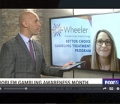Katie Kirch, LCSW, ICGC-II, BACC, clinical supervisor, Wheeler’s Bettor Choice Gambling Treatment Program, was a guest on Connoisseur Media’s “For the People Radio” show on March 17, where she highlighted Wheeler’s program and the array of services we offer for individuals and families.
Read MoreTOP RECENT HEADLINES
- Connoisseur Media’s “For the People” Radio Show Highlights Wheeler’s Bettor Choice Gambling Treatment Program (March 2024)
- U.S. Senator Richard Blumenthal Visits Wheeler’s Hartford Family Health & Wellness Center (March 2024)
- Record-Journal/CT Insider Story Highlights Recent CHDI Report: Wheeler's Dr. Elisabeth Cannata Quoted (March 2024)
- Wheeler Health Launches Innovative Residency Programs (March 2024)
- Spravato® Therapy for Depression Available Through Wheeler's Community Health Centers in Hartford and Waterbury (February 2024)
- Community Chest of New Britain and Berlin Supports Wheeler's Walk With Me Program (February 2024)
NEWSROOM
We found 12 articles related to the category Gambling Addiction.
Wheeler’s Family Health & Wellness Center at 43 Woodland Street in Hartford was the site of a visit this morning from U.S. Senator Richard Blumenthal (D-CT) where he asked sports betting companies to stop targeting problem gamblers with promotions and ads, and to make it easy for problem gamblers to remove themselves from online gaming platforms.
Read MoreMarch is Problem Gambling Awareness Month, a time to acknowledge the challenges of problem gambling and remind individuals and families that hope and recovery are possible through Wheeler’s Bettor Choice Gambling Treatment Program, funded by the Connecticut Department of Mental Health and Addiction Services (DMHAS).
Read MoreThe Connecticut Department of Mental Health and Addiction Services (DMHAS), in partnership with state and local organizations, and communities, will celebrate National Prevention Week from May 8-14, 2022.
Read MoreWith Connecticut’s legalization of online sports betting last fall, calls to the CT Helpline for Gambling Treatment (888.789.7777), and related chat messages and texts for help, have increased dramatically, underscoring the need for additional support amid a changing landscape. Wheeler's Katie Kirch, LCSW, ICGC-II, BACC, clinical supervisor, Bettor Choice Gambling Treatment Program, explains.
Read MoreWheeler’s Katie Kirch, LCSW, ICGC-II, BACC, clinical supervisor, Bettor Choice Gambling Treatment Program, was a recent guest on Connoisseur Media Connecticut's “For the People” radio program.
Read MoreWheeler's Katie Kirch, LCSW, ICGC-II, BACC, clinical supervisor, Bettor Choice Gambling Treatment Program, appeared on the Fox61 Morning Show today to discuss Problem Gambling Awareness Month and resources for individuals and loved ones struggling with this issue.
Read MoreMarch is Problem Gambling Awareness Month, which underscores the challenges of problem gambling and available resources through programs such as Wheeler’s Bettor Choice Gambling Treatment Program.
Read MoreThe COVID-19 outbreak has been stressful for everyone. People with an active gambling issue, or who are in recovery, may find this period even more challenging because of the effects of prolonged isolation, boredom, economic instability, and fear. Wheeler's Bettor Choice Gambling Treatment Program team offers tips for dealing with these challenges.
Read MoreHope that today will be better than yesterday. Hope that you can make things right.
Read MoreGambling addiction doesn’t discriminate-- it’s just as likely to impact a woman as it is a man, a minimum-wage employee as a CEO, a college student as a retired senior citizen. Compared to other addictions, gambling addictions are easy to hide. There are no physical signs or symptoms; even close loved ones might not know the truth.
Read MoreDavid Pogg’s gambling addiction began when he was a child, visiting the dog track with his grandparents. Decades later, he found himself out for a walk, staring at the icy Connecticut River, contemplating taking his own life.
Read More













